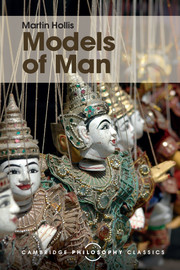Summary
Recipes for the Good Society used to run, in caricature, something like this –
Take about 2,000 hom. sap., dissect each into essence and accidents and discard the accidents.
Place essences in a large casserole, add socialising syrup and stew until conflict disappears.
Serve with a pinch of salt.
Such recipes have produced many classic dishes in political theory. All take men as they are and laws as they might be (to echo the opening sentence of Rousseau's Social Contract) but the exact ingredients vary with the chef. In particular the magic formula for the socialising syrup varies with the analysis of human nature. For instance, if men are essentially greedy egoists in pursuit of riches, fame and honour, then the syrup will be a blend of repression through fear and reward for cooperation. If men are born free, equal and good, they need only to be stewed in Enlightened education amid democratic institutions. If men are by nature the sinful children of God, then a conservative chef will distil his brew from notions like law, authority, tradition, property and patriotism, tinged with distrust of reason. But, whether the cuisine is cordon bleu, rouge or sanitaire, there is always an essence of man and a consequent syrup. The idea that political cookery is wholly an empirical, rule-of-thumb business is a fairly recent one and old-fashioned chefs would certainly retort that Michael Oakeshott, for example, cannot cook. I hope to lend some power to their elbows.
In telling us whom to obey and how to live, political theories have traditionally tackled three sorts of question. Firstly there are questions of quasi-fact about how men are constituted and how societies function. They ask, for example, how aggressive men are in a state of nature, what needs they must satisfy for self-realisation, what happens when they form groups. I dub these questions of quasi-fact because their use is scientific in intent, while their status remains crucially unclear in upshot. Secondly there are those of normative analysis, which anatomise the concepts of the theory in a way that has implications for social ethics.
- Type
- Chapter
- Information
- Models of ManPhilosophical Thoughts on Social Action, pp. 1 - 17Publisher: Cambridge University PressPrint publication year: 2015

